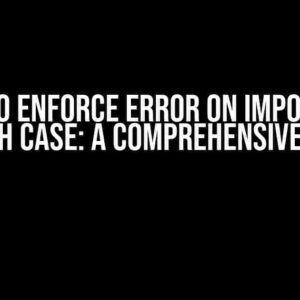Are you tired of dealing with pesky dynamic dependencies and libraries that keep your app from running smoothly? Do you dream of having a statically compiled app that’s lightning-fast and rock-solid? Well, you’re in luck because today we’re going to dive into the world of static compilation and explore how to configure your libraries and dependencies to achieve this holy grail of app development!
Why Go Static?
Before we dive into the nitty-gritty of configuration, let’s take a step back and talk about why you should even care about static compilation in the first place. Here are just a few compelling reasons:
- Faster App Startup**: Static compilation means your app loads faster, since there’s no need to load dynamic libraries or dependencies at runtime.
- Improved Security**: With a statically compiled app, you can rest assured that your code is safer from tampering or reverse-engineering.
- Better Performance**: By compiling your app statically, you can optimize performance-critical components and eliminate the overhead of dynamic loading.
- Simplified Deployment**: No more worrying about dependency versions or compatibility issues – your app is a self-contained unit that Just Works™.
Under the Hood: How Static Compilation Works
So, how does static compilation actually work? It’s relatively simple: the compiler takes your source code and links it against the necessary libraries and dependencies, resulting in a single, self-contained executable file.
+---------------+
| Source Code |
+---------------+
|
|
v
+---------------+
| Compiler |
+---------------+
|
|
v
+---------------+
| Object Code |
+---------------+
|
|
v
+---------------+
| Linker |
+---------------+
|
|
v
+---------------+
| Executable |
+---------------+
In this process, the linker resolves external references and combines the object code into a single executable file. Voilà! Your statically compiled app is born.
Configuring Your Libraries and Dependencies
Now that we’ve covered the why and the how, let’s get to the good stuff: configuring your libraries and dependencies for static compilation.
Step 1: Choose the Right Compiler
The first step is to choose a compiler that supports static compilation. For C and C++ apps, you can use GCC or Clang. For other languages, consult your compiler documentation to ensure it supports static compilation.
$ gcc -static -o myapp myapp.c
This command tells GCC to compile `myapp.c` and link it against the necessary libraries, resulting in a statically compiled executable file `myapp`.
Step 2: Identify and Prepare Your Dependencies
Next, you need to identify the libraries and dependencies required by your app. These might include:
- Third-party libraries (e.g., OpenSSL, zlib)
- System libraries (e.g., libc, libstdc++)
- Framework-specific libraries (e.g., Qt, wxWidgets)
Once you’ve identified your dependencies, you’ll need to prepare them for static compilation. This might involve:
- Compiling the dependency from source (e.g., building OpenSSL from source)
- Using a pre-compiled static library (e.g., downloading a static version of zlib)
- Configuring your build system to link against the dependency (e.g., updating your Makefile)
Step 3: Configure Your Build System
With your dependencies prepared, it’s time to configure your build system for static compilation. This will vary depending on your build toolchain:
| Build System | Static Compilation Configuration |
|---|---|
| Makefile | CC=gcc -static |
| CMake | set(CMAKE_EXE_LINKER_FLAGS "-static") |
| Autotools | configure --enable-static |
These examples demonstrate how to configure popular build systems for static compilation. Consult your build toolchain documentation for specific instructions.
Step 4: Link Against Your Dependencies
With your build system configured, it’s time to link your app against your prepared dependencies:
$ gcc -static -o myapp myapp.c -lssl -lcrypto -lz
This command tells GCC to link `myapp.c` against the OpenSSL (`libssl` and `libcrypto`) and zlib libraries, resulting in a statically compiled executable file `myapp`.
Troubleshooting Common Issues
As with any complex process, static compilation can be finicky. Here are some common issues you might encounter, along with their solutions:
Issue 1: Missing Dependencies
Error message: `undefined reference to
Solution: Double-check that you’ve correctly prepared and linked against all required dependencies.
Issue 2: Incompatible Libraries
Error message: `cannot find -l
Solution: Verify that the library is compatible with your compiler and architecture. You might need to compile the library from source or use a different version.
Issue 3: Duplicate Symbols
Error message: `duplicate symbol
Solution: Identify the source of the duplicate symbol (e.g., multiple definitions of a function) and refactor your code to eliminate the duplication.
Conclusion
And there you have it – with these steps and a dash of determination, you can configure your libraries and dependencies to compile your app as static. Remember to choose the right compiler, prepare your dependencies, configure your build system, and link against your dependencies.
By following this guide, you’ll be well on your way to creating a lightning-fast, rock-solid app that’s a true marvel of modern software engineering. Happy compiling!
And if you encounter any issues or have further questions, don’t hesitate to reach out to the community or leave a comment below.
Frequently Asked Question
Get ready to unleash the power of static compilation and say goodbye to those pesky dependencies!
What does it mean to compile my app as static, and why should I care?
Compiling your app as static means that all the libraries and dependencies required by your app are bundled together into a single executable file. This means that your app becomes self-contained and doesn’t rely on any external libraries or dependencies, making it more portable and easier to deploy. It’s like having a superpower that lets you run your app anywhere, without worrying about compatibility issues!
How do I configure my build system to compile my app as static?
The configuration process varies depending on your build system and programming language. For example, if you’re using CMake, you can set the `BUILD_SHARED_LIBS` option to `OFF` to compile your app as static. If you’re using GCC, you can use the `-static` flag. You can also use tools like `staticx` or `Linuxbrew` to help you with the process. Just remember to check the documentation for your specific build system and language to get the exact instructions.
What are the benefits of compiling my app as static?
Where do I even start? Compiling your app as static gives you better portability, easier deployment, and improved performance. You don’t have to worry about compatibility issues or missing dependencies, which means you can focus on what really matters – building an awesome app! Plus, static compilation can help reduce the attack surface of your app, making it more secure.
Are there any downsides to compiling my app as static?
Well, there are some trade-offs to consider. Compiling your app as static can make the executable file larger, which can affect startup time and memory usage. Additionally, if you’re using a lot of libraries, the compilation process can take longer. But hey, it’s a small price to pay for the benefits you get in return!
How do I handle third-party libraries when compiling my app as static?
When it comes to third-party libraries, you have a few options. You can either compile the libraries as static yourself, or you can use pre-compiled static libraries provided by the library authors. Some libraries might not be available as static, in which case you’ll need to find alternative solutions. But don’t worry, with a little creativity and perseverance, you can make it work!


